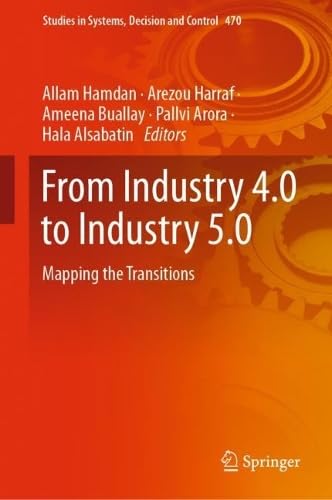
Free Download From Industry 4.0 to Industry 5.0: Mapping the Transitions by Allam Hamdan, Arezou Harraf, Amina Buallay, Pallvi Arora, Hala Alsabatin
English | PDF EPUB (True) | 2023 | 1020 Pages | ISBN : 3031283139 | 53.4 MB
This book aims at bringing together global researchers to generate thought on how this transition from Industry 4.0 to Industry 5.0 could make a difference to the globe for larger good. The collaboration and interaction between man and machine has given rise to Industry 5.0. With the prime objective of Industry 5.0 to create a benefit for the human beings while tapping on to the advantage of Industry 4.0, in no case, does it replace what has already been achieved. In fact, it brings to light what can be done in order to make life better. While Industry 4.0 offered extraordinary technological advancement, Industry 5.0 reasons out that technology alone is not sufficient to answer everything or provide a solution, but it is an amalgamation of both machine and human interaction to create that difference. In fact, with the impact of widespread digitalization that has led to dehumanization of the industrial makeup, the interest of global researchers has increased toward mapping how the human creativity and brainpower can be reconciled with the intelligent systems that can enhance process efficiency.
Industry 5.0 has touched upon some of those key domains which are of much concern and debate globally including resilience (both business and cyber), environment and sustainability, diversity and inclusion, values and ethics, vision and purpose, circular economy, understanding the human-machine collaboration and the 'human-touch' in the production process.
This transition that has taken place in moving from Industry 4.0 to Industry 5.0 has essentially created a need to pay cognizance to the role of 'human' in the process which creates an enhanced focus toward the right kind of skills and competencies, identification of training and developmental needs, talent acquisition and management, safety and wellbeing, future of work as well as hybrid working models.
Undeniably, the pace with which Industry 4.0 has been accelerating has bypassed the first three industrial revolutions, which is definitely a consequence of the fast introduction of new and cutting-edge technologies. While organizations are already in analyzing the context, mapping this transition and the flow of activities from Industry 4.0 to 5.0 is gaining attention as Industry 4.0 lacked personalization and customization. This co-existence of man and machine creates a pathway for newer prospects and opportunities to emerge and expand possibilities of personalization with the empowerment of 'human' in the production process.
This lays the foundation for this book. This book adopts a forward-looking approach by bringing in research and contributions that facilitate in mapping the consereasons, consequences and solutions for 'man+machine' across industries. This book serves as a guide not just to academia but also to the industry to adopt suitable strategies that offer insights into global best practices as well as the innovations in the domain.
[/b]
From Industry 4.0 to Industry 5.0 Mapping the Transitions Torrent Download , From Industry 4.0 to Industry 5.0 Mapping the Transitions Watch Free Link , From Industry 4.0 to Industry 5.0 Mapping the Transitions Read Free Online , From Industry 4.0 to Industry 5.0 Mapping the Transitions Download Online
